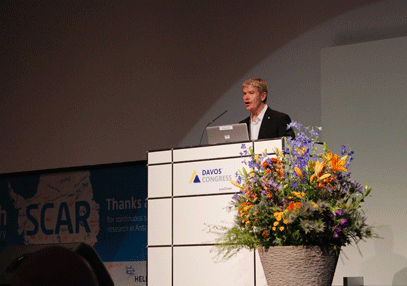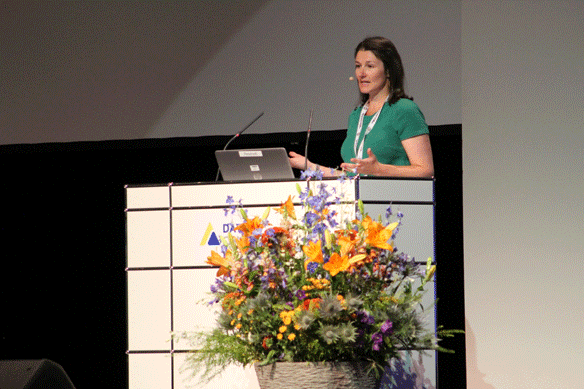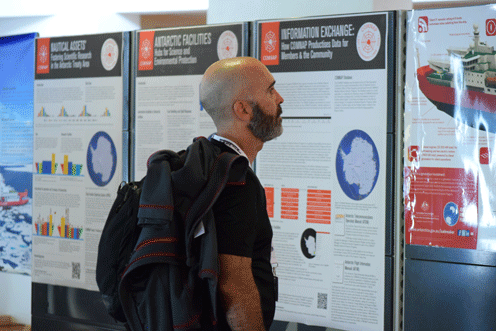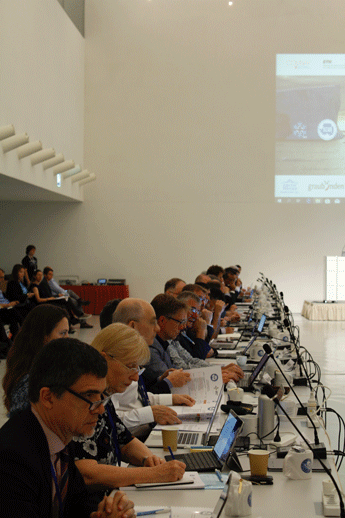It’s been almost 2 months since we returned from the Polar 2018 meeting in Davos. While everyone is winding down after the busy conference period (we hope!), we thought we’d take the chance to share some of our personal highlights from the meeting.
Polar 2018 was a joint event between SCAR and the International Arctic Science Committee (IASC) so was even busier than SCAR’s regular biennial meetings. It incorporated business meetings, SCAR/IASC’s Open Science Conference, SCAR’s XXXVth biennial Delegates Meeting and the IASC 2018 Arctic Science Summit Week as well as a host of satellite events.
The theme for Polar 2018 was ‘Where the poles come together‘. The mixing of Antarctic, Arctic and Third Pole research in most sessions provided new perspectives for everyone, as highlighted in a recent article in the journal Antarctic Science.
Altogether we welcomed over 2500 attendees who presented 1600 posters and 1000 oral papers as well as plenary sessions, panel discussions, side meetings and social events. Polar 2018 also gave the SCAR Secretariat a valuable chance to meet people whom we liaise with on a day-to-day basis throughout the year. I had only just joined SCAR as Executive Director, so I’d like to thank everyone for making me feel so welcome.
SCAR’s President Steven Chown spoke to a packed auditorium at the Opening Ceremony of the Open Science Conference on the morning of June 19th. His comment that polar research held immense importance, not just for our understanding of the world we live in today, but also for the world we are building for tomorrow and for our understanding of our universe really hit home with the audience.
Birthday celebrations!
This meeting was particularly special because SCAR celebrated its 60th birthday. As part of the celebrations SCAR hosted an informal gathering on 18th  June. Thanks to COMNAP, the Tinker Foundation and Macquarie Point Development Corporation for sponsorship. Thanks also to Stephen Curtain for producing our “History of SCAR” video in collaboration with the Secretariat. Stephen is also working with us on a “What is SCAR?” video, so watch this space! If you’d like to use any of this material at your own event, please email us at info@scar.org.
June. Thanks to COMNAP, the Tinker Foundation and Macquarie Point Development Corporation for sponsorship. Thanks also to Stephen Curtain for producing our “History of SCAR” video in collaboration with the Secretariat. Stephen is also working with us on a “What is SCAR?” video, so watch this space! If you’d like to use any of this material at your own event, please email us at info@scar.org.
SCAR also held a lively panel discussion on Wednesday 20th June on ‘Polar Change and the Future of Society‘, sponsored by the journals Nature and Nature Communications. In the same week, Nature released 11 articles on Antarctica which generated a surge of interest in the contribution of the Antarctic Ice Sheet to future sea level rise. Many thanks to our panel members (listed here) and chair Michael White (Nature) for making the event such a success.
Communicating across boundaries
SCAR and IASC hosted a joint plenary session on the afternoon of Wednesday 20th. Our six excellent panellists shared their experiences of ‘Communicating Polar Science across Boundaries’ – whether within disciplines, across disciplines, or beyond. We ran the discussion using an online platform rather than the traditional roving mic approach. It was a bit of a risk but well worth taking – almost 200 attendees engaged with the discussion and there were over 70 questions.

Plenary lectures and awards
 Thanks to all SCAR’s keynote speakers for their excellent presentations followed by animated discussions. Dr Elizabeth Thomas from BAS delivered the Weyprecht lecture entitled ‘Frozen in time – Unlocking the Earth’s climate history using ice cores’ on 20th June. On 21st June, SCAR’s 10th Tinker Muse Prize Winner Mike Meredith gave a well-received plenary lecture on ‘Changes in Southern Ocean Circulation and Properties‘, highlighting the importance of sustained observations in this most challenging of environments. On 22nd June, Jan Strugnell from James Cook University, Australia, spoke about using genomic data to date West Antarctic Ice Sheet Collapse. Finally, on 23rd June, Anna Wahlin from the University of Gothenburg, Sweden, delivered a lecture on the global importance of the Southern Ocean.
Thanks to all SCAR’s keynote speakers for their excellent presentations followed by animated discussions. Dr Elizabeth Thomas from BAS delivered the Weyprecht lecture entitled ‘Frozen in time – Unlocking the Earth’s climate history using ice cores’ on 20th June. On 21st June, SCAR’s 10th Tinker Muse Prize Winner Mike Meredith gave a well-received plenary lecture on ‘Changes in Southern Ocean Circulation and Properties‘, highlighting the importance of sustained observations in this most challenging of environments. On 22nd June, Jan Strugnell from James Cook University, Australia, spoke about using genomic data to date West Antarctic Ice Sheet Collapse. Finally, on 23rd June, Anna Wahlin from the University of Gothenburg, Sweden, delivered a lecture on the global importance of the Southern Ocean.
At the Conference Dinner, SCAR awarded its biennial SCAR Medals to three recipients. The Medal for International Coordination went to Prof Terry Wilson; the Research Excellence Medal was awarded to Prof Mike Hambrey and the first Medal for Education and Communication was awarded to Prof James McClintock. More details will follow on our website soon.
Polar science and inclusion
On Wednesday 20th, I was delighted to speak to a packed room as part of a panel on ‘Perspectives of Women in Polar Research‘. It was an inspiring event covering a huge range of issues from bullying and harassment through to how to stem the ‘leaky pipeline’ in polar science. A strong message from panellists, attendees and those following on social media, was that inclusivity of everyone (whether they identified as he, she, or they) is critical for progress in polar science.
The Davos meeting also saw the launch of a new network by researchers of SCAR and IASC to bring together the LGBTQ+ (lesbian, gay, bisexual, transgender, queer +) community and Allies (friends and supporters of the LGBTQ+ community) to celebrate diversity and inclusivity in polar research. An anonymous, moderated mailing list has been formed to help promote the network’s message and to highlight events that may be of interest to the members. The @PridePolar Pride in Polar Science Twitter account was also created, to keep those interested in the activities of the network up to date.

Poster sessions
The poster sessions gave researchers the chance to present their work to their peers in an informal setting. Here, too, all aspects of polar research were represented, from psychology research which investigated the effects of isolation on team dynamics to microbiology research that explored the composition of microbial communities in various regions of Antarctica and investigations into the complex history of human presence in the Southern Polar regions.
Delegates meeting – new groups
An official report of the XXXVth SCAR delegates meeting on 25th/26th June will be published in due course. Highlights include Delegates’approval of the establishment of a new Standing Committee on Humanities and Social Sciences and a new expert group on Astronomy and Astrophysics.
 A number of new action groups have been established: Earth Observation (Physical Sciences), ANGWIN – ANtarctic Gravity Wave Instrument Network (Physical Sciences), AntArchitecture (Geosciences and Physical Sciences), IMPACT – Input Pathways of Persistent Organic Pollutants to Antarctica (Life Sciences), SKAG – Krill action group (Life Sciences) and Plastics in Polar Environment (Life Sciences).
A number of new action groups have been established: Earth Observation (Physical Sciences), ANGWIN – ANtarctic Gravity Wave Instrument Network (Physical Sciences), AntArchitecture (Geosciences and Physical Sciences), IMPACT – Input Pathways of Persistent Organic Pollutants to Antarctica (Life Sciences), SKAG – Krill action group (Life Sciences) and Plastics in Polar Environment (Life Sciences).
SCAR’s current Scientific Research Programmes (SRPs) will come to an end in 2020 and discussions are underway on what will follow. The role of Programme Planning Groups (PPGs) is to develop proposals for future SRPs. The procedure to establish a new Scientific Research Programme is explained in more detail here.
At the Delegates Meeting, three new PPGs were proposed: Integrated science to support Antarctic and Southern Ocean conservation (ANT-ICON); Near-term Variability and Prediction of the Antarctic Climate System (AntClimnow) and Antarctic Ice Sheet Dynamics and Global Sea Level (AISSL). We will post more information about all these groups our website in due course. If you need any more information in the interim, please direct enquiries to info@scar.org.
Executive committee members
We’re excited to welcome our three new Executive Committee members, appointed at this meeting – Dr Catherine Ritz (Vice President for Science), Dr M Ravichandran (Vice President for Capacity Building) and Professor Gary Wilson (Vice President for Administration). Professor Jefferson Cardia Simões continues as Vice President for Finance.
Please stay in touch!
Life at the secretariat is now returning to normal after our busy summer. We’ll be issuing a newsletter with updates from us and from the community in the Autumn. Please also do email us if you have any news you would like us to share (even if it’s just a tweet!) or events to add to the SCAR calendar. We would love to help you spread the word.
We also always welcome visitors to our offices at the ScottPolar Research Institute so, if youare passing through Cambridge, please let us know.
Finally we would love to thank our gracious local hosts the Swiss Federal Institute for Forest, Snow and Landscape Research, under the patronage of the Swiss Committee on Polar and High Altitude Research. Credit for the organization of Polar2018 is due to the Local Organizing Commitee and Advisory Board, as well as the International Scientific Organizing Committee, and we would like to congratulate them on their efforts. We would also like to extend our thanks to the staff at the Davos Congress Centre, for being so helpful over the course of the event.
We are already looking forward to seeing you all at SCAR 2020 in Hobart!
– SCAR Executive Director Dr Chandrika Nath, on behalf of the SCAR Secretariat
